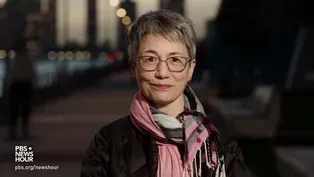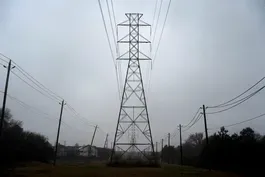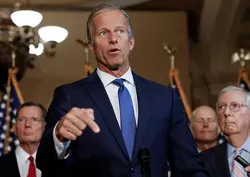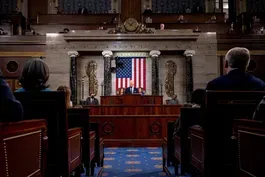
New England and Frederick Douglass' first steps to freedom
Clip: 2/7/2023 | 6m 51sVideo has Closed Captions
New England's role in Frederick Douglass' first steps to freedom
When Frederick Douglass escaped slavery he was aided by friends in the daring and dangerous getaway. He went from being on the run to becoming one of the most influential Americans of the 19th century. Pamela Watts of Rhode Island PBS Weekly has Douglass’ story as he took his first steps to freedom.
Problems with Closed Captions? Closed Captioning Feedback
Problems with Closed Captions? Closed Captioning Feedback
Major corporate funding for the PBS News Hour is provided by BDO, BNSF, Consumer Cellular, American Cruise Lines, and Raymond James. Funding for the PBS NewsHour Weekend is provided by...

New England and Frederick Douglass' first steps to freedom
Clip: 2/7/2023 | 6m 51sVideo has Closed Captions
When Frederick Douglass escaped slavery he was aided by friends in the daring and dangerous getaway. He went from being on the run to becoming one of the most influential Americans of the 19th century. Pamela Watts of Rhode Island PBS Weekly has Douglass’ story as he took his first steps to freedom.
Problems with Closed Captions? Closed Captioning Feedback
How to Watch PBS News Hour
PBS News Hour is available to stream on pbs.org and the free PBS App, available on iPhone, Apple TV, Android TV, Android smartphones, Amazon Fire TV, Amazon Fire Tablet, Roku, Samsung Smart TV, and Vizio.
Providing Support for PBS.org
Learn Moreabout PBS online sponsorshipAMNA NAWAZ: Frederick Douglass was once a fugitive from slavery who was aided by friends in a daring and dangerous escape.
He went from being on the run to becoming one of the most influential Americans of the 19th century.
Pamela Watts of Rhode Island PBS Weekly has Douglass' story as he took his first steps to freedom.
LEE BLAKE, President, New Bedford Historical Society: Throughout his life, from the time he gains freedom, he works constantly for freedom and for freedom for his brothers and sisters, meaning the African American community.
He spoke out for women.
At one point in time, he is in England, and how important it is for the English to take their foot off the neck of the Irish.
So, he was somebody who worked all the time for equality.
PAMELA WATTS: That early civil rights activist was born a Southern slave.
Frederick Augustus Washington Bailey later changed his name to Frederick Douglass to elude capture.
He escaped bondage, arriving in Newport in 1838.
Historian Lee Blake explains why he could not stay there.
LEE BLAKE: Because Newport, Rhode Island, is a slave state.
And one thing people forget is how involved Rhode Island was in the slave trade.
Many of the slave ships that came to the United States came into Rhode Island.
PAMELA WATTS: But Douglass and his new wife, Anna Murray Douglass, do find safe harbor, however briefly, in Newport with the free Black family of Isaac Rice.
The Rice homestead still stands on the corner of Thomas and Williams streets and was a station on the Underground Railroad.
The Douglasses were whisked by stagecoach to New Bedford.
LEE BLAKE: From that corner down about four blocks is all Abolition Row.
PAMELA WATTS: Blake, who is president of the New Bedford Historical Society, says it is to this whaling city neighborhood, now the historic district Abolition Row, that Douglass is sent.
He has his first taste of life as a free man in the home of Nathan and Polly Johnson.
What role did this very house that we're sitting in have in shaping Frederick Douglass' life?
LEE BLAKE: Nathan and Polly Johnson, who were African American entrepreneurs, were part of the Underground Railroad.
So this is an Underground Railroad site.
And when Anna and Frederick come here, they have just been married just three or four days, but Frederick was 20 years old.
So, we are so used to seeing Frederick Douglass as an elder statesman, we forget he has a foundation story.
And this house is part of the foundation story.
PAMELA WATTS: The Johnsons' house sits side by side with those of Quaker families, whose meeting house is also on the street.
Anti-slavery Quakers were active in the city's whaling trade and employed many African Americans.
LEE BLAKE: New Bedford is a really unique place at that time.
New Bedford is a bustling whaling port, but it's also a place with a large free Black population.
Massachusetts ends slavery in 1783.
So people here are free, and are able to go about their business as citizens.
PAMELA WATTS: Douglass finds work on the docks in New Bedford and marvels at the opportunity in the seaport town.
LEE BLAKE: He's able to vote here.
Voting in New Bedford was not segregated.
He paid his poll tax, $1.50.
And, in the 1840s, he's voting.
On New Bedford, African Americans were running people for elections for different posts and positions.
So, New Bedford teaches him the possibility and the hope of what freedom might really look like if people were equal.
PAMELA WATTS: Douglass is also able to attend church and act as a lay minister, where he learns he needs to speak up.
LEE BLAKE: He talks about getting the sacrament in one of the churches, where he's sitting in the back pew.
He gets the sacraments last, and he just can't believe it.
And he writes about that.
And he writes about how Christians were hypocritical.
PAMELA WATTS: So, as good as it was here, it wasn't perfect.
LEE BLAKE: Yes.
Right.
He's also able to write and put little editorials in the paper.
So he develops a voice here, which he wouldn't have developed anywhere else.
PAMELA WATTS: And that voice brings an invitation to speak in Nantucket, a transformational moment when the audience meets the eloquent, literate, self-educated Douglass.
LEE BLAKE: He's very hesitant, but he speaks and talks about his life as an enslaved person.
But, at that time, many of the abolitionist had never really met a slave.
So, Douglass becomes really important, because he can communicate that message of what it was like to be enslaved.
He would talk about his relationship with his mother, who he only saw a couple of times his whole life, and of the beatings that he had.
PAMELA WATTS: Blake says Douglass not only gave a powerful first-person voice to the evils of slavery; he gave a face, an imposing, intellectually gifted leader.
LEE BLAKE: Douglass had a whole rationale for that.
Douglass wrote essays about photography.
He thought photography was so important, that photography was going to be able to show white Americans that the humanity of Black people was the same as their humanity.
But he also was looking at the idea that, at the time, white people were making sure that there were stereotypes of Black people, that they would do pictures that were demeaning, that depicted them as less intelligent.
So he really was pushing the whole idea that that wasn't true.
PAMELA WATTS: Blake says Douglass and his family lived in New Bedford for about five years.
He would return many times to visit.
Right across the street from the Johnson home, construction is now under way on Abolition Row Park, and at its heart will be a statue of Frederick Douglass.
The statue depicts Douglass in his waterfront working clothes and will bear his quote "Truth, justice, liberty and humanity will ultimately prevail," the same words inscribed on the Senate chamber walls of the Massachusetts Statehouse.
For the "PBS NewsHour," I'm Pamela Watts in New Bedford, Massachusetts.
Biden to outline accomplishments and tout optimism for U.S.
Video has Closed Captions
Clip: 2/7/2023 | 6m 4s | Biden to outline accomplishments and tout optimism for U.S., White House spokesperson says (6m 4s)
A Brief But Spectacular take on the power of poetry
Video has Closed Captions
Clip: 2/7/2023 | 2m 30s | A Brief But Spectacular take on the power of poetry (2m 30s)
Earthquake death toll rises by thousands in Turkey, Syria
Video has Closed Captions
Clip: 2/7/2023 | 12m 25s | Desperate rescues continue in Turkey and Syria as earthquake death toll rises by thousands (12m 25s)
FBI foils plot to bring down Baltimore’s electrical grid
Video has Closed Captions
Clip: 2/7/2023 | 6m 34s | FBI foils extremist plot to bring down Baltimore’s electrical grid (6m 34s)
S.D. Sen. Thune on what he wants from State of the Union
Video has Closed Captions
Clip: 2/7/2023 | 8m 1s | South Dakota Sen. John Thune on what he wants to hear from State of the Union (8m 1s)
What to expect from Biden's State of the Union address
Video has Closed Captions
Clip: 2/7/2023 | 5m 24s | What to expect from Biden's State of the Union address (5m 24s)
Providing Support for PBS.org
Learn Moreabout PBS online sponsorshipSupport for PBS provided by:
Major corporate funding for the PBS News Hour is provided by BDO, BNSF, Consumer Cellular, American Cruise Lines, and Raymond James. Funding for the PBS NewsHour Weekend is provided by...
















